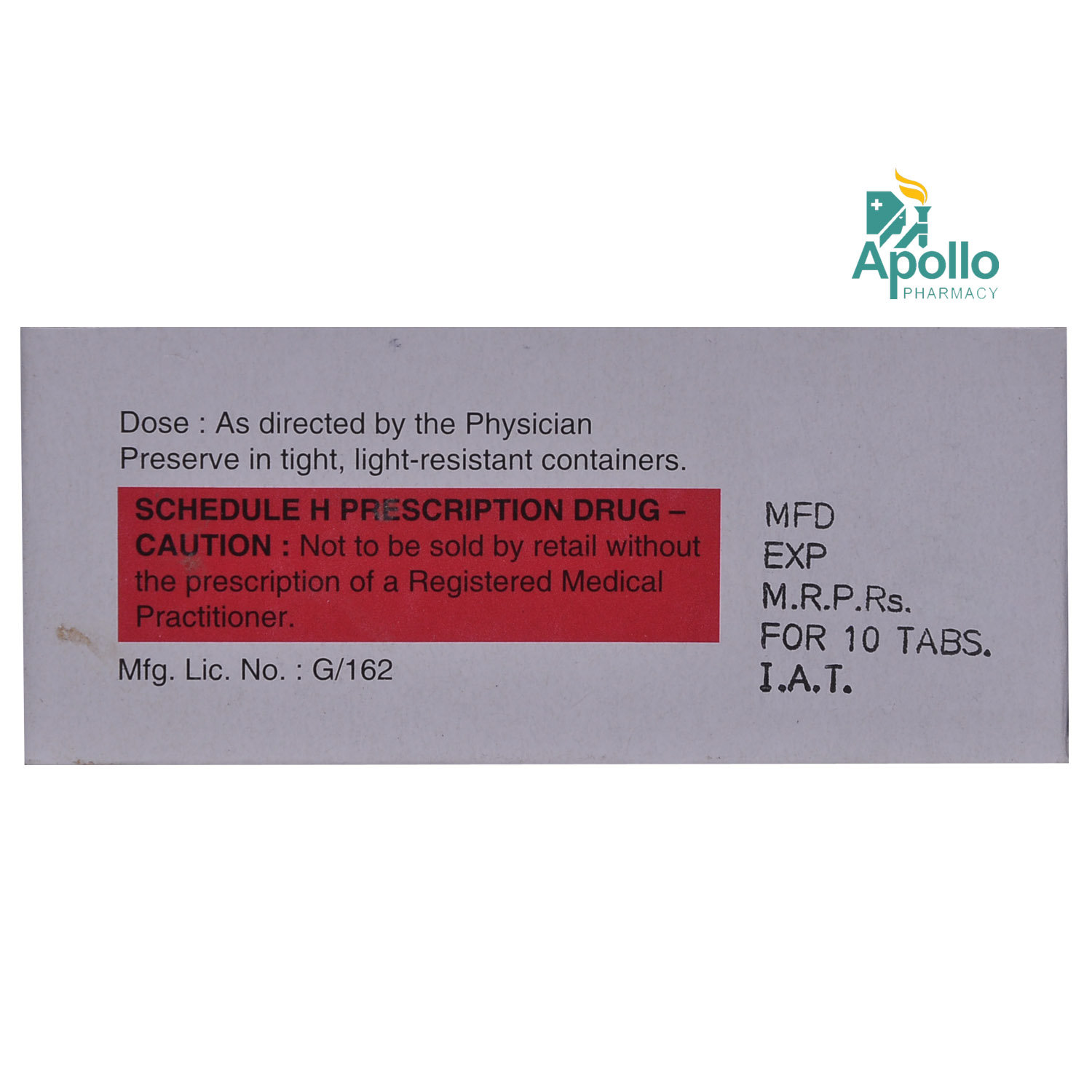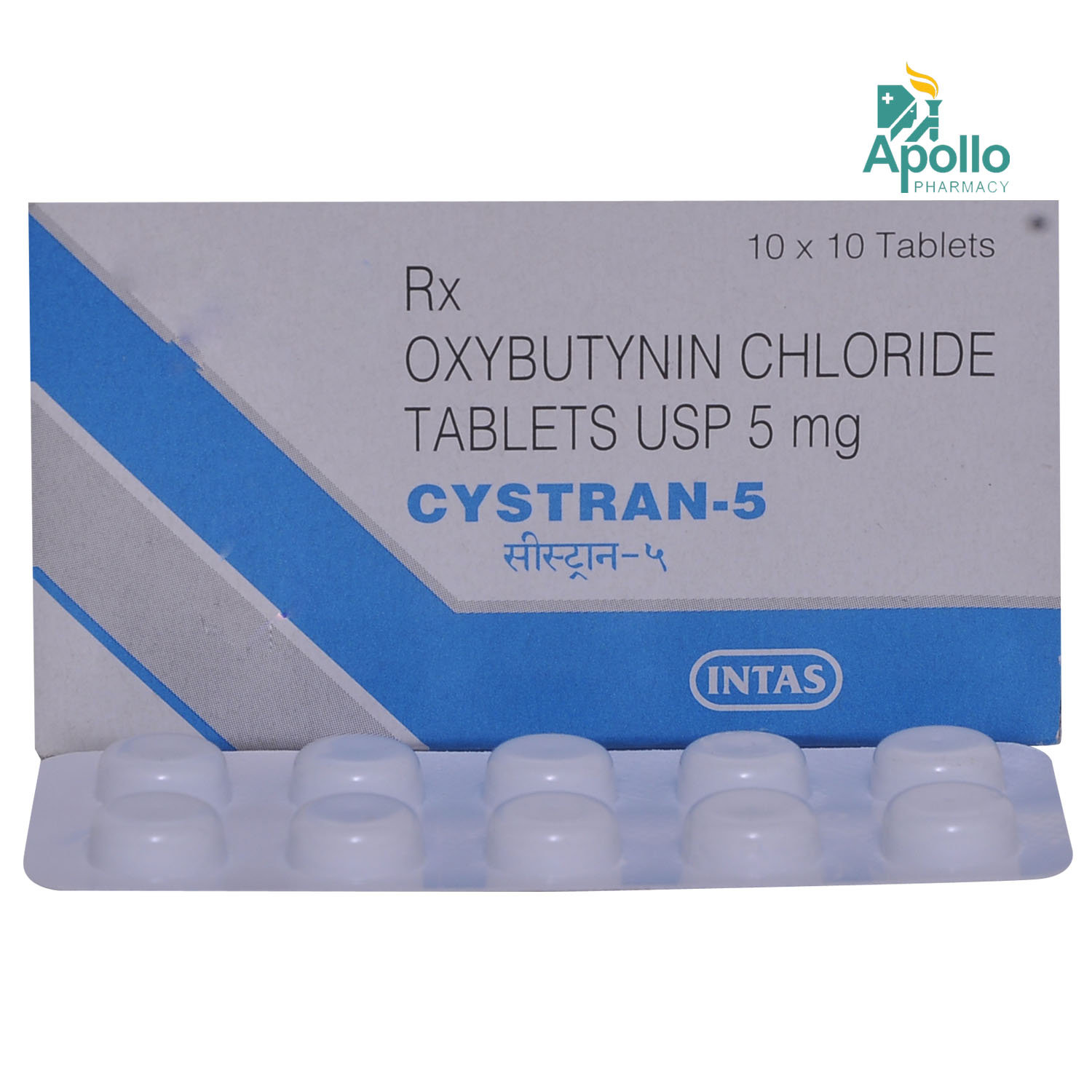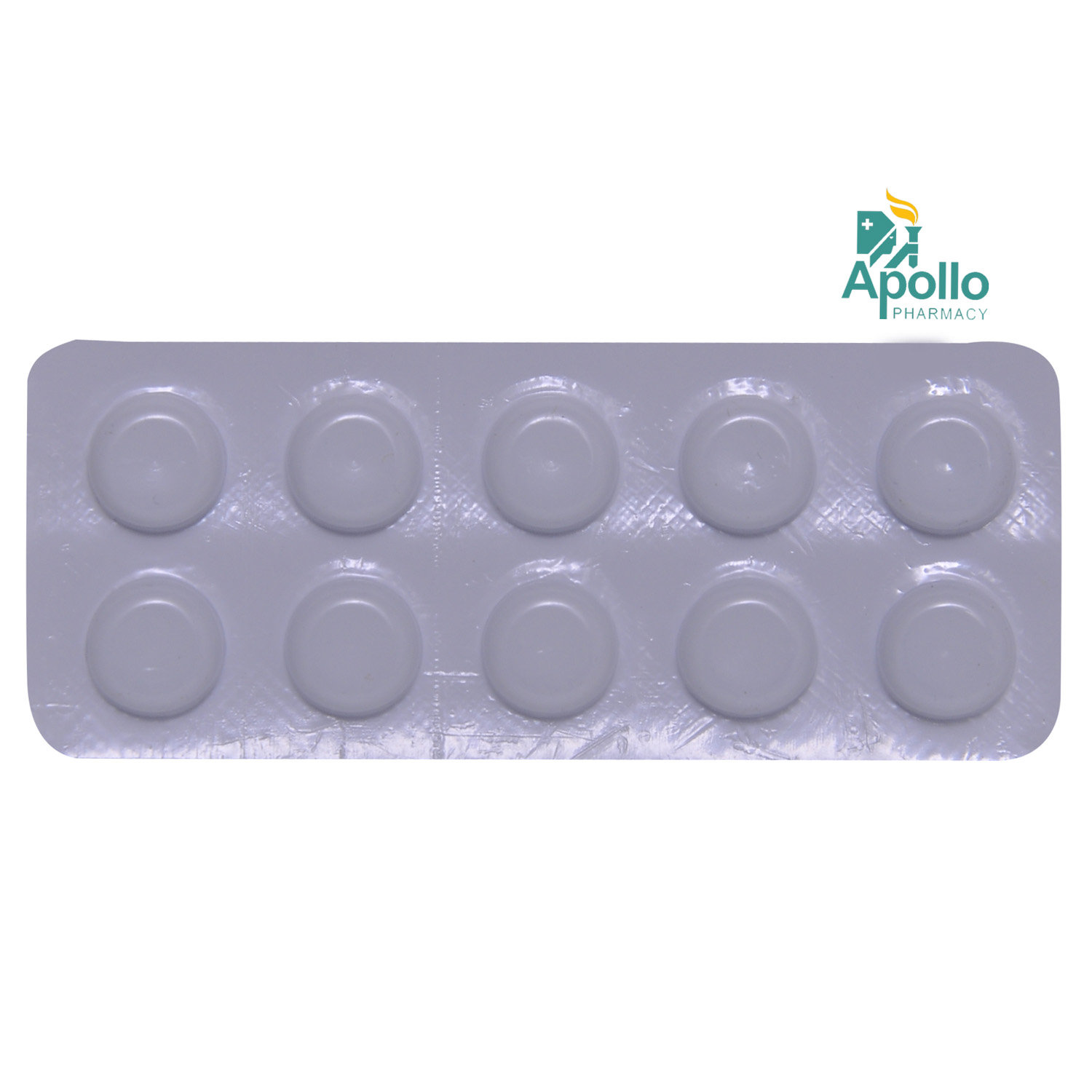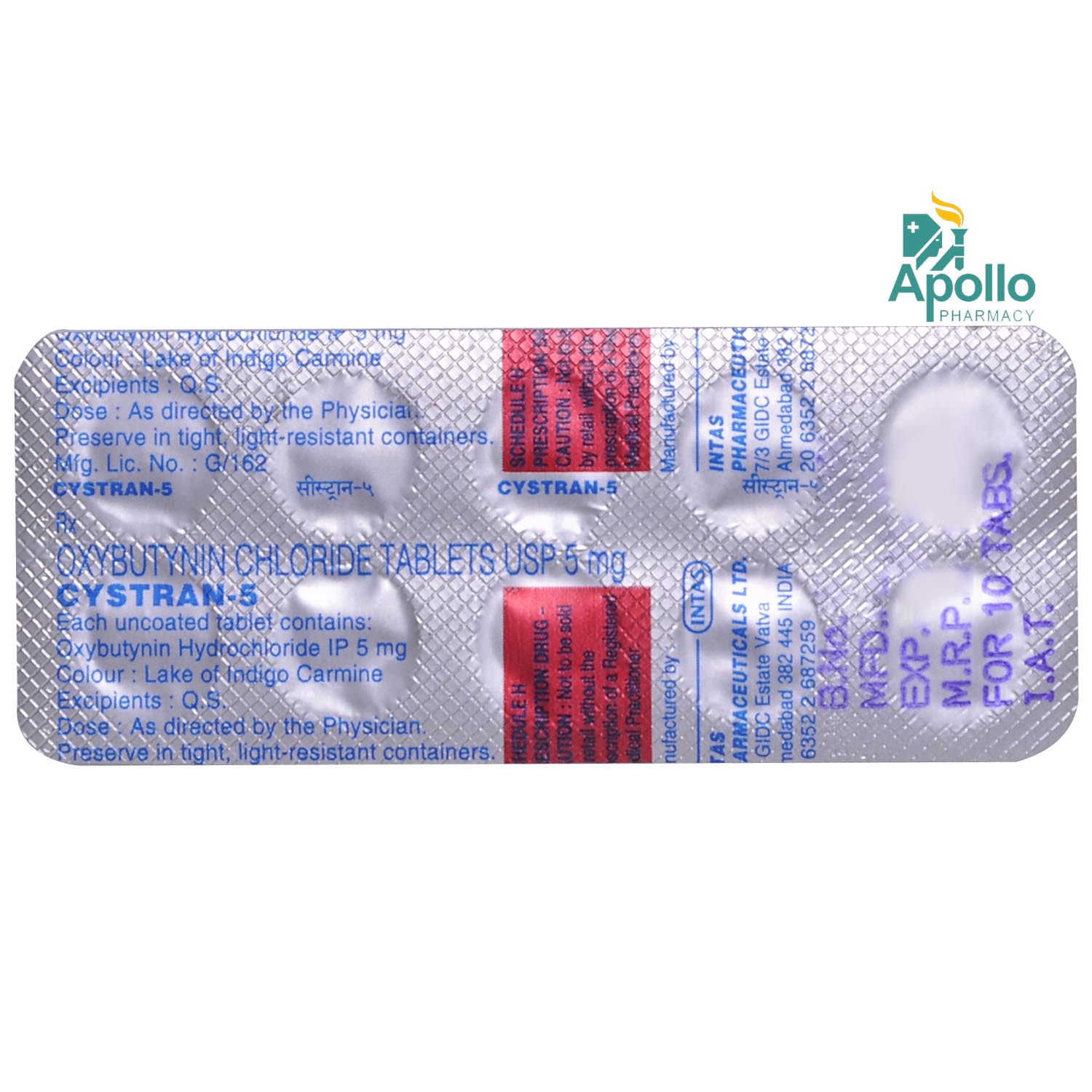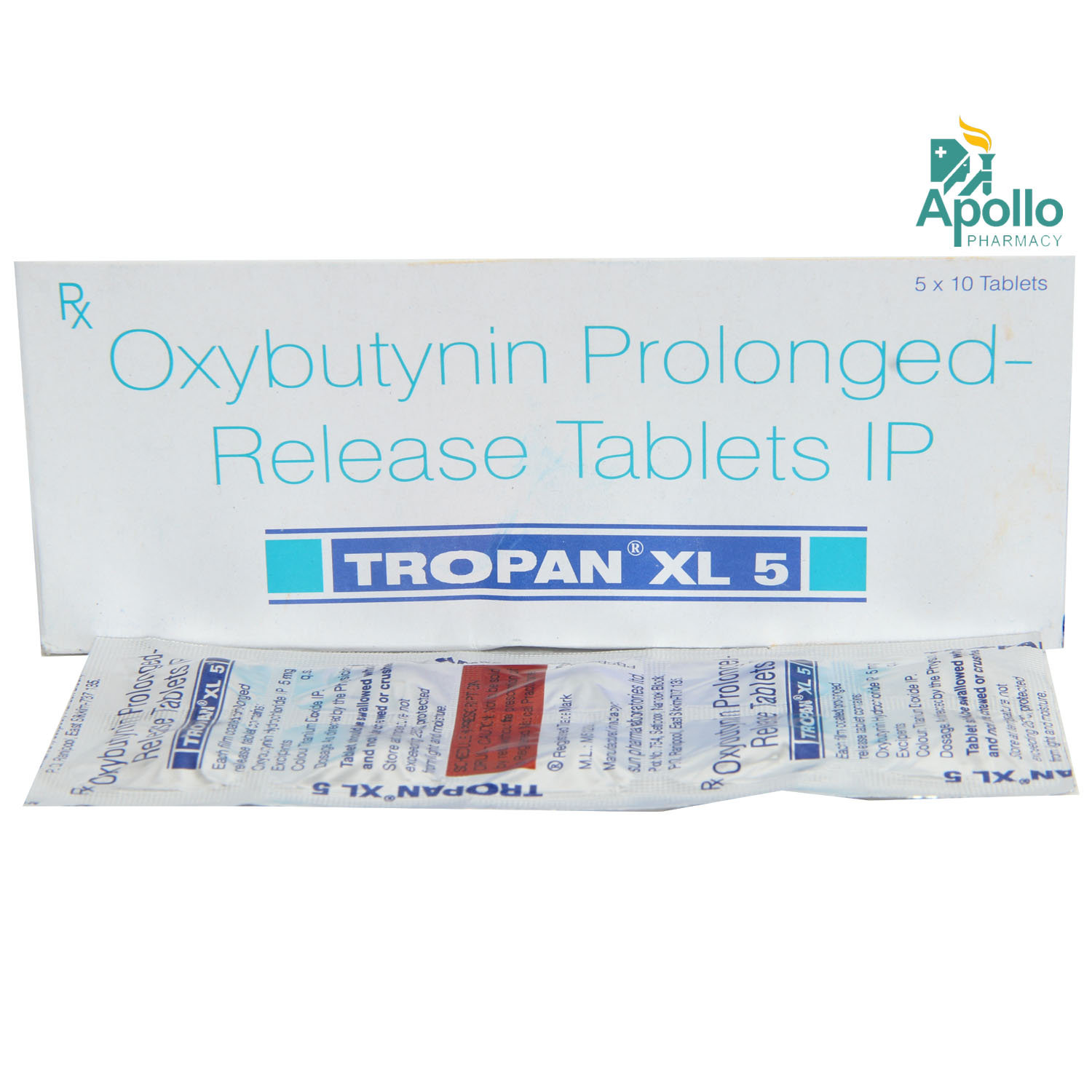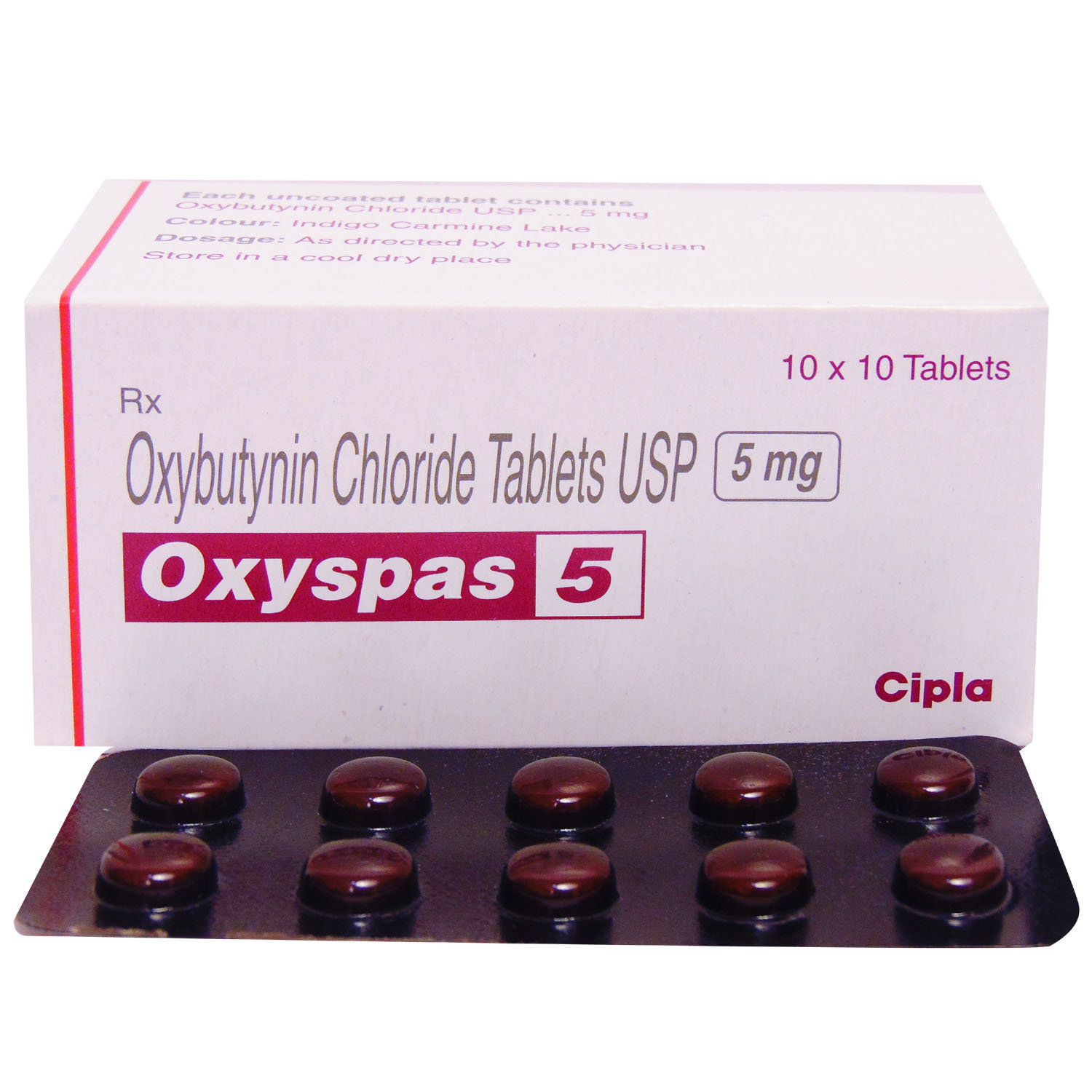Cystran 5 Tablet 10's
MRP ₹238
(Inclusive of all Taxes)
₹35.7 Cashback (15%)
Know Your Delivery Time
Provide Delivery Location

Secure Payment

India's Most Trusted Pharmacy

Genuine Products
Composition :
Manufacturer/Marketer :
Consume Type :
Return Policy :
Expires on or after :
About Cystran 5 mg Tablet
Cystran 5 mg Tablet belongs to the group of medicines called anti-spasmodic, and anti-cholinergic agents used to treat overactive bladder (OAB) with symptoms of urinary incontinence (urine leakage), urgent or frequent urination, increased night-time urination, dysuria (painful or difficult urination). Additionally, Cystran 5 mg Tablet is used to treat night-time bed-wetting in children above 5 years when other treatments have not worked.
Cystran 5 mg Tablet contains 'Oxybutynin', which works by blocking the release of a chemical transmitter called acetylcholine, responsible for bladder muscle contractions. Thereby relaxing the smooth muscles of the urinary bladder and stopping sudden muscle spasms (contractions). This helps control urine by delaying the initial desire to empty the bladder and increases the urine holding capacity of the bladder.
You are advised to take Cystran 5 mg Tablet for as long as your doctor has prescribed it for you, depending on your medical condition. In some cases, you may experience certain common side-effects such as dizziness, sleepiness, headache, facial flushing, constipation, dry mouth, dry skin, urinary retention, and diarrhoea. Most of these side-effects do not require medical attention and will resolve gradually over time. However, you are advised to talk to your doctor if you experience these side-effects persistently.
Consult your doctor if you are pregnant or breastfeeding; your doctor will prescribe only if the benefits outweigh the risks. Cystran 5 mg Tablet may cause dizziness, drowsiness, sleepiness, and blurred vision; so drive only if you are alert. Cystran 5 mg Tablet should not be given to children below 5 years as safety and efficacy have not been established. Avoid consuming alcohol along with Cystran 5 mg Tablet as it could lead to increased drowsiness. Keep your doctor informed about your health condition and medications to rule out any unpleasant side-effects.
Uses of Cystran 5 mg Tablet
Cystran 5 mg Tablet is used in the treatment of overactive bladder. The detailed uses of Cystran 5 mg Tablet are as follows:
- Manages overactive bladder: Cystran 5 mg Tablet helps to reduce symptoms like frequent urination, sudden urges to urinate, and urine leakage by relaxing bladder muscles.
- Neurogenic bladder support: Cystran 5 mg Tablet is used to treat bladder control problems caused by nerve damage from conditions affecting the brain, spinal cord, or nerves (like in neurogenic detrusor overactivity).
- Improves bladder control: Cystran 5 mg Tablet supports better control over urination and helps to reduce nighttime bathroom visits, improving daily comfort and sleep.

Have a query?
Directions for Use
- Take Cystran 5 mg Tablet with or without food or as advised by a doctor.
- Recommended to take the medicine once a day or as advised by your doctor.
- Swallow the medicine as a whole with glass of water.
- Do not crush, break, or chew it.
Medicinal Benefits
Cystran 5 mg Tablet belongs to the group of medicines called anti-spasmodic and anticholinergic agents. Cystran 5 mg Tablet is used to treat overactive bladder with urinary incontinence symptoms (urine leakage), urgent or frequent urination, increased night-time urination, and dysuria (painful or difficult urination). Cystran 5 mg Tablet works by blocking the release of a chemical transmitter called acetylcholine, responsible for bladder muscle contractions. Thereby relaxing the smooth muscles of the urinary bladder and stopping sudden muscle spasms (contractions). This helps control urine by delaying the initial desire to empty the bladder and increasing the bladder's urine-holding capacity. Cystran 5 mg Tablet decreases both frequency and urgency of urination and helps with bladder control in people with overactive bladder. Cystran 5 mg Tablet is also used to treat night-time bed-wetting in children above 5 years when other treatments have not worked.
How Cystran 5 mg Tablet Works
Storage
- Inform your doctor about dry mouth symptoms. They may adjust your medication regimen or prescribe additional medications to manage symptoms.
- Drink plenty of water throughout the day to help keep your mouth moist and alleviate dry mouth symptoms.
- Chew sugar-free gum or candies to increase saliva production and keep your mouth moisturized.
- Use saliva substitutes, such as mouthwashes or sprays, only if your doctor advises them to help moisturize your mouth and alleviate dry mouth symptoms.
- Avoid consuming smoking, alcohol, spicy or acidic foods, and other irritants that may aggravate dry mouth symptoms.
- Schedule regular dental check-ups to keep track of your oral health and handle any dry mouth issues as they arise.
- Inform your doctor about your constipation symptoms. They may adjust your medication or advise alternative treatments.
- Stay hydrated by drinking sufficient of water (at least 8-10 glasses a day) to help soften stool and promote bowel movements.
- Increase fibre intake by eating foods high in fibre, such as fruits, whole grains, vegetables and legumes, to help bulk up the stool.
- Establish a bowel routine by trying to go to the bathroom at the same time each day to train your bowels.
- Engaging in regular exercise, like walking or yoga, can support in bowel movement stimulation.
- Consult your doctor if constipation persists, and discuss alternative treatments or adjustments to your medication.
- Avoid driving or operating machinery or activities that require high focus until you know how the medication affects you.
- Maintain a fixed sleeping schedule, create a relaxing bedtime routine and ensure your sleeping space is comfortable to maximize your sleep quality.
- Limit alcohol and caffeine as these may worsen drowsiness and disturb sleep patterns.
- Drink plenty of water as it helps with alertness and keeps you hydrated and for overall well-being.
- Moderate physical activity can improve energy levels, but avoid intense workouts right before bedtime.
- Inform your doctor about the nausea and discuss possible alternatives to the medication or adjustments to the dosage.
- Divide your daily food intake into smaller, more frequent meals to reduce nausea.
- Opt for bland, easily digestible foods like crackers, toast, plain rice, bananas, and applesauce.
- Avoid certain foods that can trigger nausea, such as fatty, greasy, spicy, and smelly foods.
- Drink plenty of fluids, such as water, clear broth, or electrolyte-rich beverages like coconut water or sports drinks.
- Use ginger (tea, ale, or candies) to help relieve nausea.
- Get adequate rest and also avoid strenuous activities that can worsen nausea.
- Talk to your doctor about taking anti-nausea medication if your nausea is severe.
- Record when your nausea occurs, what triggers it, and what provides relief to help you identify patterns and manage your symptoms more effectively.
- Apply moisturizer immediately after showering or bathing.
- Use a moisturizer containing lanolin, petroleum jelly, glycerine, hyaluronic acid or jojoba oil.
- Do not use hot water for bathing. Instead use warm water and limit showers and bath to 5 to 10 minutes.
- Apply a sunscreen with SPF-30 or higher.
- Avoid harsh soaps, detergents and perfumes.
- Do not scratch or rub the skin.
- Drink adequate water to prevent dehydration.
- Wear pants, full sleeves and a wide-brimmed hat while going out in the sun.
- Rest well; get enough sleep.
- Eat a balanced diet and drink enough water.
- Manage stress with yoga and meditation.
- Limit alcohol and caffeine.
- Physical activities like walking or jogging might help boost energy and make you feel less tired.
- Inform your doctor about dizziness symptoms. They may adjust your medication regimen or prescribe additional medications to manage symptoms.
- Follow your doctor's instructions for taking medication, and take it at the same time every day to minimize dizziness.
- When standing up, do so slowly and carefully to avoid sudden dizziness.
- Avoid making sudden movements, such as turning or bending quickly, which can exacerbate dizziness.
- Drink plenty of water throughout the day to stay hydrated and help alleviate dizziness symptoms.
- If you're feeling dizzy, sit or lie down and rest until the dizziness passes.
- Track when dizziness occurs and any factors that may trigger it, and share this information with your doctor to help manage symptoms.
What if I have taken an overdose of Cystran 5 mg Tablet
Drug Warnings
Do not take if you are allergic to any of its contents; if you have myasthenia gravis (muscle problems), narrow-angled glaucoma, blockage/perforation in the stomach or intestine, ulcerative colitis (inflammation of the large intestine), urinary blockage, frequent urination at night caused by kidney or heart disease. Inform your doctor if you are 65years or older; if you have an overactive thyroid, high blood pressure, glaucoma, irregular heartbeats, enlarged prostate, gastrointestinal disorders, indigestion, heartburn, heart, liver or kidney problems. Cystran 5 mg Tablet may cause dizziness, drowsiness, sleepiness, and blurred vision, so drive only if you are alert. Cystran 5 mg Tablet should not be given to children below 5 years as safety and efficacy have not been established. Avoid consuming alcohol along with Cystran 5 mg Tablet as it could lead to increased drowsiness. Consult your doctor immediately if you experience hallucinations while taking Cystran 5 mg Tablet .
Drug-Drug Interactions
Drug-Drug Interactions
Login/Sign Up
Coadministration of Cystran 5 Tablet and Potassium citrate can increase the risk of developing stomach ulcers or bleeding.
How to manage the interaction:
Taking Cystran 5 Tablet with Potassium citrate is generally avoided as it may lead to an interaction, it can be taken if prescribed by the doctor. Consult the doctor immediately if you experience severe stomach pain, bloating, lightheadedness, dizziness, vomiting (especially with blood), decreased hunger, or dark stools. Do not discontinue any medications without a doctor's advice.
Coadministration of Cystran 5 Tablet with Potassium chloride can increase the risk of developing stomach ulcers.
How to manage the interaction:
Taking Cystran 5 Tablet with Potassium chloride is generally avoided as it can lead to an interaction, it can be taken when a doctor has prescribed it. Consult the doctor immediately if you experience severe stomach pain, bloating, lightheadedness, dizziness, vomiting (especially with blood), decreased hunger, or dark stools. Do not discontinue any medication without contacting a doctor.
Coadministration of Secretin with Cystran 5 Tablet can reduce the effects of Secretin, which may reduce its treatment outcomes.
How to manage the interaction:
Although there is a possible interaction between Cystran 5 Tablet and Secretin, you can take these medicines together if prescribed by your doctor. If you experience any symptoms, contact your doctor immediately. Do not discontinue any medications without consulting your doctor.
Co-administration of Cystran 5 Tablet and Topiramate can increase the risk of developing body temperature and decrease sweating.
How to manage the interaction:
Co-administration of Cystran 5 Tablet and Topiramate can lead to an interaction, it can be taken if advised by your doctor. Contact your doctor immediately if you experience symptoms like decreased sweating, fever, or drowsiness. Drink plenty of fluids during warm weather and when exercising, and do not discontinue any medications without consulting a doctor.
Coadministration of Cystran 5 Tablet with Zonisamide can increase the risk or severity of Zonisamide side effects like increased body temperature and decreased sweating especially in warm weather.
How to manage the interaction:
Taking Cystran 5 Tablet with Zonisamide together is not recommended as it can result in an interaction, it can be taken if your doctor has advised it. However, contact a doctor immediately if you experience increased heart rate, fever, or excessive sweating. Make sure to hydrate yourself during warm weather or after exercise. Do not discontinue any medications without consulting a doctor.
Drug-Food Interactions
Drug-Food Interactions
Login/Sign Up
Diet & Lifestyle Advise
- Pelvic floor exercises would help treat bladder spasms.
- Avoid foods like sugars, carbonated beverages, tea, citrus fruits, tomatoes, spicy foods, chocolate and tea.
- Limit fluid intake as excess fluid intake could cause an urge to urinate frequently.
- Avoid drinking excess alcohol or caffeinated drinks as they can worsen the symptoms.
- Maintain a healthy weight, and exercise regularly.
- Avoid smoking and alcohol intake.
- Take 6-8glasses or liquids every day.
- Avoid processed foods. Instead, choose whole, unprocessed foods.
- Include fruits, vegetables, and fibre-rich food in your diet.
Habit Forming
Therapeutic Class
All Substitutes & Brand Comparisons
RX
Tropan XL 5 Tablet 10's
Sun Pharmaceutical Industries Ltd
₹225
(₹20.25 per unit)
5% CHEAPERRX
Oxyspas 5 Tablet 10's
Cipla Ltd
₹248
(₹22.33 per unit)
4% COSTLIER
Alcohol
Unsafe
You are recommended to avoid alcohol consumption while taking Cystran 5 mg Tablet . Alcohol intake, along with Cystran 5 mg Tablet , may cause increased drowsiness.
Pregnancy
Caution
Cystran 5 mg Tablet belongs to pregnancy category B. Please consult your doctor if you have any concerns regarding this; your doctor will prescribe you Cystran 5 mg Tablet only if the benefits outweigh the risks.
Breast Feeding
Caution
Cystran 5 mg Tablet may pass into breastmilk. Please consult your doctor if you have any concerns regarding this; your doctor will decide whether breastfeeding mothers can take Cystran 5 mg Tablet or not.
Driving
Unsafe
Cystran 5 mg Tablet may cause dizziness, drowsiness, sleepiness, and blurred vision. Do not drive or operate heavy machinery unless you are alert.
Liver
Caution
Please consult your doctor before taking Cystran 5 mg Tablet if you have a liver impairment or any concerns regarding this.
Kidney
Caution
Please consult your doctor before taking Cystran 5 mg Tablet if you have kidney impairment or any concerns regarding this.
Children
Safe if prescribed
Cystran 5 mg Tablet can be given to children above 5years if prescribed by the doctor.
Heart
Unsafe
Cystran 5 mg Tablet is not recommended for use in heart patients due to its adverse effects.
Geriatrics
Unsafe
This medicine is not safe for use in elderly patients due to its serious side effects.
FAQs
Cystran 5 mg Tablet is used to treat overactive bladder (OAB) with symptoms of urinary incontinence (urine leakage), urgent or frequent urination, increased night-time urination, dysuria (painful or difficult urination). Additionally, it is used to treat night-time bed-wetting in children above 5 years when other treatments have not worked.
Cystran 5 mg Tablet works by blocking the release of a chemical transmitter called acetylcholine which is responsible for bladder muscle contractions. Thereby relaxing the smooth muscles of the urinary bladder and stopping sudden muscle spasms (contractions).
Dry mouth could be a side-effect of Cystran 5 mg Tablet . Limiting caffeine intake, avoiding smoking and mouthwashes containing alcohol, drinking water regularly, and chewing sugar-free gum/candy might help stimulate saliva and thereby prevents drying of the mouth.
There is some overlap between the symptoms of both OAB and BPH. OAB occurs due to uncontrolled urinary bladder muscle contractions. The main symptom of OAB is a sudden urge to urinate that is hard to control. On the other hand, BPH occurs due to an enlarged prostate gland, which puts pressure on the urinary bladder, thereby causing pain during urination.
Cystran 5 mg Tablet should be used with caution during hot weather as it may increase the chance of having a heat stroke. Avoid becoming dehydrated or overheated during exercise and in hot weather. Inform your doctor if you have heat intolerance or fever.
Consult your doctor before taking Cystran 5 mg Tablet if you have glaucoma. Cystran 5 mg Tablet is contraindicated in patients with narrow-angle glaucoma. Contact your doctor immediately if you experience loss of vision, blurred vision, or pain in the eye.
Cystran 5 mg Tablet may reduce the amount of saliva, thereby causing fungal infection of the mouth and tooth decay. To avoid this, maintain proper oral hygiene while taking Cystran 5 mg Tablet . A regular dental check-up is recommended if you are on long-term treatment with Cystran 5 mg Tablet .
Country of origin
Manufacturer/Marketer address
Disclaimer
Author Details
We provide you with authentic, trustworthy and relevant information


